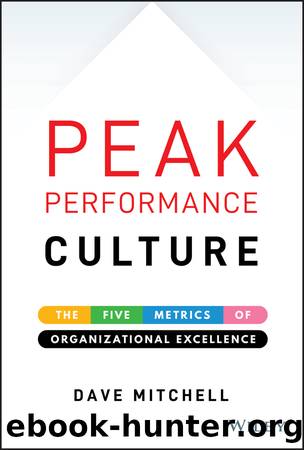Peak Performance Culture by Dave Mitchell

Author:Dave Mitchell [Mitchell, Dave]
Language: eng
Format: epub
ISBN: 9781119581505
Publisher: Wiley
Published: 2020-09-01T00:00:00+00:00
INTRINSIC NEEDS FULFILLMENT
The importance of a leadership ideology predicated on benevolent accountability is never more obvious than its impact on the intrinsic needs of the organization's employees. As I have discussed in my last two books, individuals perform at their highest capabilities when their respective intrinsic needs are being met within the organizational environment. There are four iconic intrinsic needs that we all possess. While each of us desire all four, we have a primary intrinsic need based on our preferred interactive style.
Some employees â individuals I call âRomanticsâ â thrive in workplaces that contain abundant praise and appreciation. These employees often selfâsacrifice, take on job responsibilities that others avoid, and volunteer to do tasks when others refuse. In exchange for being eager team players, they desire the recognition of their leader â even if they outwardly express no need for such. These contributors are emotionally sensitive and seek to know that their leader genuinely recognizes their dedication and loyalty. A leader who practices a âno news is good newsâ approach to employee communication will demotivate this employee.
As previously described, âWarriorsâ get things done. They are typically efficient performers and highly productive. They prefer a leader who provides direction and then leaves them alone to accomplish the desired outcome. Independence is the intrinsic reward that drives their performance. Their logical orientation contributes to a keen awareness and disdain for activities, interactions, and processes that are unnecessary. Competitive and renowned for being a selfâstarter, this type of employee finds a meddlesome leader to be a nightmare.
If Warriors are known for the quantity of their work, âExpertsâ are the quality contributors. They apply best practices based on their personal experiences. They rue mistakes, particularly ones that they have made, and strive to avoid them at all costs. Being accurate â doing things the right way â requires depth of information. They are most comfortable in situations that provide comprehensive training and education, consistent policies and procedures, and few surprises. Romantics soar with praise, Warriors with independence, and the Experts with security.
Finally, âMastermindsâ are the risk takers. They have an entrepreneurial orientation. The thought of repetitive, predictable routines does not inspire them and, in fact, bores them. Masterminds like what's new and different and will seek novel challenges, special projects, and other ways to customize their employment experience. They need options. Leading a Mastermind requires that you continually stimulate them with new directions, responsibilities, and possibilities.
The terms âbenevolent accountabilityâ and âpragmatic creativityâ in many ways reflect the four types of interactive style and their respective intrinsic needs: benevolent (Romantic), accountability (Warrior), pragmatic (Expert), and creativity (Mastermind). Any effective leadership ideology must be inclusive of and accessible to all styles. Fulfilling these four intrinsic needs â appreciation, independence, security, and options â assures that your leadership ideology is contributing to peak performance. For more information on the four iconic styles of people, check out my book The Power of Understanding People.
Download
This site does not store any files on its server. We only index and link to content provided by other sites. Please contact the content providers to delete copyright contents if any and email us, we'll remove relevant links or contents immediately.
Bullshit Jobs by David Graeber(4167)
Radical Candor by Kim Scott(2706)
I Am Right, You Are Wrong by Edward De Bono(2434)
23:27 by H. L. Roberts(2240)
Nomadland by Jessica Bruder(2053)
Average Is Over by Tyler Cowen(1833)
The Conflict Resolution Phrase Book by Barbara Mitchell & Cornelia Gamlem(1760)
Out of Our Minds: Learning to Be Creative by Ken Robinson(1727)
High-Impact Interview Questions by Victoria A. Hoevemeyer(1678)
The Ideal Team Player by Patrick M. Lencioni(1631)
An Everyone Culture: Becoming a Deliberately Developmental Organization by Robert Kegan & Lisa Laskow Lahey(1629)
Who Moved My Cheese?: An Amazing Way to Deal With Change in Your Work and in Your Life by Johnson Spencer(1627)
The Asshole Survival Guide by Robert I. Sutton(1595)
Automatic Society by Bernard Stiegler(1544)
Unleashed by Anne Morriss & Frances Frei(1532)
Who by Street Randy & Smart Geoff(1492)
42 Rules of Employee Engagement by Susan Stamm(1461)
96 Great Interview Questions to Ask Before You Hire by Paul Falcone(1441)
Fish! by Stephen C. Lundin(1392)
